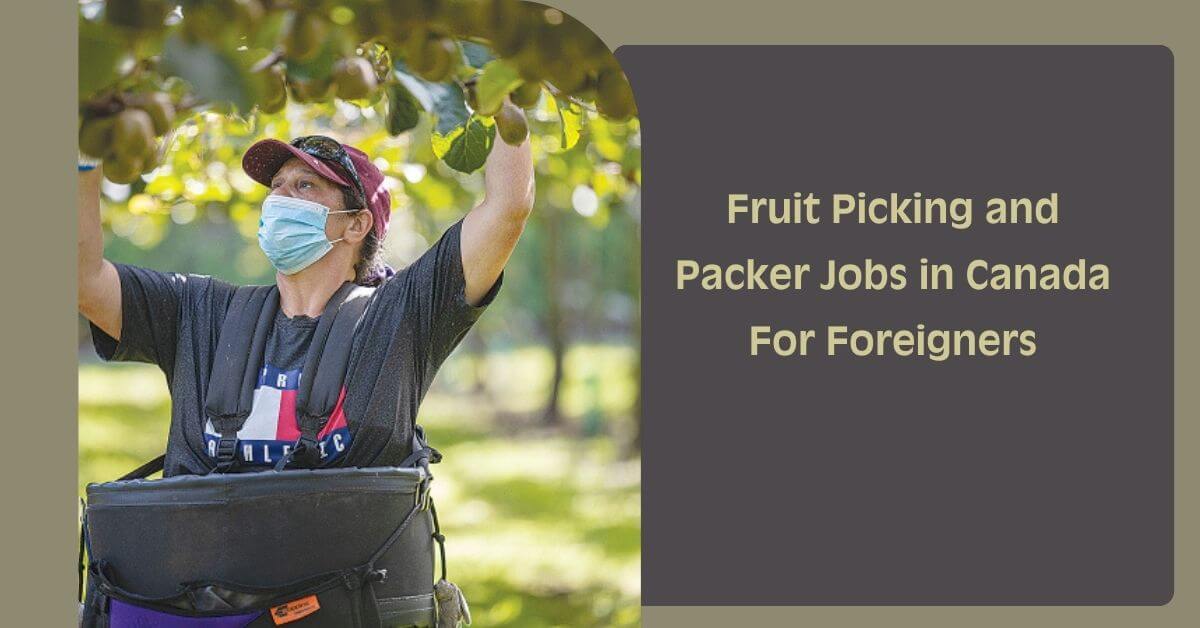Fruit picking and packer jobs in Canada for foreigners are in high demand, offering roles in harvesting, sorting, and packaging fruits. Salaries range from CAD $15 to $20 per hour, with monthly earnings up to CAD $3,500 depending on experience and location. Many positions provide visa sponsorship and work permit support, making Canada an ideal destination for seasonal agricultural workers seeking legal employment and valuable Canadian work experience.
Details of Fruit Picking and Packer Job in Canada:
- Title: Fruit Picking and Packer Jobs in Canada For Foreigners
- Job Country: Canada
- Job Type: Farm Worker
- Who Can Apply: Canadians and International Candidates from any country
- LMIA: Yes, Positive LMIA Approved
- Visa Type: Agriculture Worker
- Duration of Stay: 2-3 Years
- Eligible NOC Codes: 80020, 80021, 82030, 82031, 84120, 85100, 85101, and 85103
- Required Education: Secondary or Higher
- Employment Type: Permanent
Fruit Picking & Packing:
- Apples
- Grapes
- Plums
- Peaches
- Prunes
- Cherries
- Strawberries
- Raspberries
Benefits of Jobs:
Canada provides a supportive and rewarding work environment for fruit pickers and packers, with a range of benefits to attract and support workers:
- Accommodation
- Many firms provide their employees with on-site or nearby housing options to guarantee a convenient and comfortable living situation while they are working. This lessens the strain of looking for accommodation on your own.
- Traveling Allowance
- Some employers provide travel allowances or reimbursements to cover the costs of commuting to and from the workplace, making it easier for workers to manage transportation expenses.
- Medical Insurance
- Health insurance frequently covers workers, guaranteeing access to medical treatment while they are employed in Canada. This benefit offers peace of mind during the employment term and aids in the management of healthcare expenses.
- Visa Sponsorship
- Employers frequently assist with visa sponsorship, which makes it easier for foreign workers to get legal entry and work authorization. This is important for people who want to work in Canada during the harvest season.
- Competitive Salaries
- Depending on the business, region, and level of experience, fruit pickers and packers in Canada often earn competitive hourly earnings between $14 and $20. With this wage rate, employees can obtain useful experience while earning a respectable living.
Opportunities:
Fruit picker and packer roles are essential during the summer months when the demand for fresh produce is at its peak. These positions provide valuable employment opportunities for individuals looking to work in agriculture and contribute to the food supply chain. Key points about these job opportunities include
1. Seasonal Work
- Timing: Harvest season jobs usually extend from late spring to early October, however this varies by crop and region.
- Fruit harvesting, sorting, packing, and distribution preparation are the duties of the workers.
2. Open to All Applicants
- Residents and Citizens of Canada: Local laborers are urged to apply in order to support local agriculture and add to the seasonal workforce.
- Temporary Foreign Workers: Foreign workers who are able to apply for work permits and receive visa sponsorship are also eligible for these roles, which will enable them to earn work experience in Canada.
3. Opportunities for Skill Development
- Training and Experience: While prior experience can be beneficial, many employers provide training to help new workers learn proper picking and packing techniques.
- Physical and Team Skills: The job helps develop physical endurance, teamwork, and time management, valuable skills in various fields.
4. Potential for Long-Term Employment
- Repeat Opportunities: Workers who perform well during their first harvest may be granted the opportunity to return for subsequent harvests, gaining experience and maybe establishing long-term work relationships with employers.
5. Regions and Variety
- Locations: Jobs are available in Canada’s fruit-growing regions, including British Columbia, Ontario, Quebec, and the Maritimes.
- Crops: Depending on the location, workers may be responsible for collecting and packing a variety of crops such as apples, cherries, strawberries, blueberries, peaches, and more.
LMIA Approval:
LMIA (Labor Market Impact Assessment) approval is an important step in the process. It highlights the need for foreign labor when there aren’t enough Canadian citizens or permanent residents to fill specialized agricultural jobs.
Requirements:
To work in Canada as a foreign farm worker, several requirements must be met to ensure compliance with immigration laws and job standards. Here are the key requirements for foreign workers seeking employment in farm-related positions:
1. Job Offer
- Valid Offer: Candidates must have a valid work offer from a Canadian company. This is often required when applying for a work permit through programs such as the Temporary Foreign Worker Program (TFWP).
2. Work Permit
- Application: Foreign farm laborers must get a work permit from Immigration, Refugees, and Citizenship Canada (IRCC). The business is normally required to conduct a Labour Market Impact Assessment (LMIA) to verify that no Canadian workers are available for the position.
- Work permits are often transitory in nature, valid for a set length of time that corresponds to the harvest season.
3. Employer’s Support
- Sponsorship: The employer must support the worker’s application for a work visa by ensuring that they meet all employment standards, present all required papers, and assist with administrative procedures.
4. Health and Security Clearances
- Medical Examination: Workers may be required to have a medical examination to ensure they are in good health and do not pose a risk to public health.
- Background Checks: Security clearances or background checks may be required to confirm that the employee has no criminal history.
5. Temporary Resident Visa (TRV) or Electronic Travel Authorization (eTA)
- Visa Requirement: Depending on the worker’s country of citizenship, a TRV or eTA may be necessary for entry into Canada.
- Application: Workers should apply for a TRV or eTA after receiving their work permit approval.
6. Language Proficiency
- Basic Language Skills: While fluency in English or French is not generally required for farm labor, it can be useful for communicating with supervisors and colleagues. Some employers may have special language requirements for jobs that need more engagement.
7. Proof of Funds
- Financial Stability: Workers may be required to demonstrate that they have enough money to support themselves after they arrive in Canada and begin receiving a paycheck.
8. Compliance with Conditions
- Work criteria: Foreign farm workers must follow all criteria outlined in their work permit, including employment role, location, and working hours.
- Legal Compliance: To avoid potential violations or penalties, employees should observe Canadian labor laws as well as the terms imposed by their employer.
9. Transportation Arrangements
- Employers frequently provide transportation from the employee’s point of arrival in Canada to the workplace site. In some situations, the worker may be required to organize their own travel, but the employer is often responsible for the expense or reimbursement.
Conclusion:
Fruit picking and packing jobs in Canada provide an excellent opportunity for both local and international candidates to gain valuable experience while earning competitive pay. With benefits like accommodation, medical insurance, and visa sponsorship, these roles offer a rewarding experience in a dynamic agricultural environment. By meeting the necessary application requirements and securing the appropriate work permit, candidates can embark on a productive and enriching work term in Canada.
Frequently Asked Questions:
What is the duration for fruit picking jobs in Canada?
These positions typically last from late spring to early October, depending on the crop and region.
How can international workers apply for these jobs?
Workers need a valid job offer from a Canadian employer, a work permit, and possibly a Temporary Resident Visa (TRV) or Electronic Travel Authorization (eTA). Employers assist with the LMIA process and visa sponsorship.






